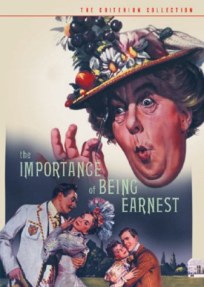The Importance of Being Earnest (1952 film)
| The Importance of Being Earnest | |
|---|---|

Criterion Collection DVD cover
|
|
| Directed by | Anthony Asquith |
| Produced by | Teddy Baird Earl St. John |
| Written by |
Oscar Wilde Anthony Asquith |
| Starring |
Michael Redgrave Michael Denison Edith Evans Joan Greenwood Dorothy Tutin Margaret Rutherford Miles Malleson |
| Music by | Benjamin Frankel |
| Cinematography | Desmond Dickinson |
| Edited by | John D. Guthridge |
| Distributed by |
The Rank Organisation (UK) Universal Pictures (USA) |
|
Release date
|
2 June 1952 (UK) 22 December 1952 (NYC) |
|
Running time
|
95 minutes |
| Country | United Kingdom |
| Language | English |
| Box office | £139,000 |
The Importance of Being Earnest (1952) is a British film adaptation of the play by Oscar Wilde. It was directed by Anthony Asquith, who also adapted the screenplay, and was produced by Anthony Asquith, Teddy Baird, and Earl St. John.
This 1952 Anthony Asquith faithful film adaptation is considered to be the "best known version of Oscar Wilde's perennial classic." (Variety) This is a Victorian screwball comedy about mistaken identity. It is about rivalries and the class system with no moral message, just unmatched witty dialogue and one-liners in the true Wilde style. The stage origins of this story are evident in Asquith's adaptation.
The story takes place on 14 February 1895. It is about two gentlemen pretending to be people other than themselves. Interwoven in their story lines are two romance-stricken ladies, each possessing an unusual allegiance to the manliness of the name Ernest. London man-about-town Jack Worthing, who hides behind the name Ernest, is an aristocrat from the country with uncertain lineage. His friend, Algernon Moncrieff, is of moderate means and has also created an imaginary character, Bunbury. Algernon’s cousin, Gwendolen Fairfax, has caught the eye of Jack. Jack’s ward in the country, Cecily Cardew, has caught the eye of Algernon. Lady Bracknell rules the roost with her heavy-handed social mores.
The story begins in London. Jack and Algy are discussing life and love. Both reveal to each other their imaginary characters, Ernest and Bunbury. Jack reveals that he is in love with Algy’s cousin, Gwendolen and Algy reveals that he is in love with Jack’s ward, Cecily. Both gentlemen begin to scheme the pursuit of their loves. At tea that afternoon, Jack and Gwendolen secretly reveal their love for one another. Gwendolen makes it known that her “ideal has always been to love someone by the name of Ernest.” Jack fears she will find out his true identity. Lady Bracknell, in undulating purple silk Victorian attire, inquires as to Jack’s pedigree. “Rise, sir, from that semi-recumbent posture. It is most indecorous.” Jack confesses that he does not know who his parents are because, as a baby, he was found in a handbag in a cloakroom at Victoria Station. “A handbag?” Lady Bracknell will not allow her daughter “—a girl brought up with the utmost care—to marry into a cloak-room, and form an alliance with a parcel.”
At the manor house in the country, Cecily is daydreaming as her governess, Miss Prism, tries to teach her German. Uninvited, Algy arrives from London and assumes the role of Ernest. While Algy and Cecily are getting acquainted in the parlour, Jack arrives in black mourning clothes and informs Miss Prism that his brother, Ernest, is dead. When Algy and Cecily come out to see him, the sad news loses its believability as everyone now thinks Algy is Ernest. In pursuit of Jack, Gwendolen arrives from London and meets Cecily. They both discover that they are engaged to Ernest, not realizing one is Jack and one is Algy. When the men arrive in the garden, the confusion is cleared up. The ladies are put off that neither one is engaged to someone named Ernest.
...
Wikipedia
